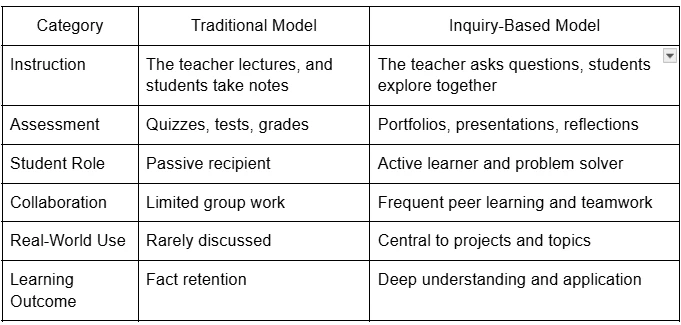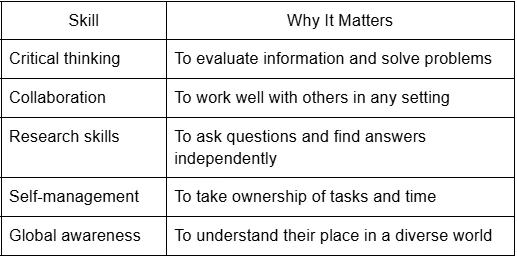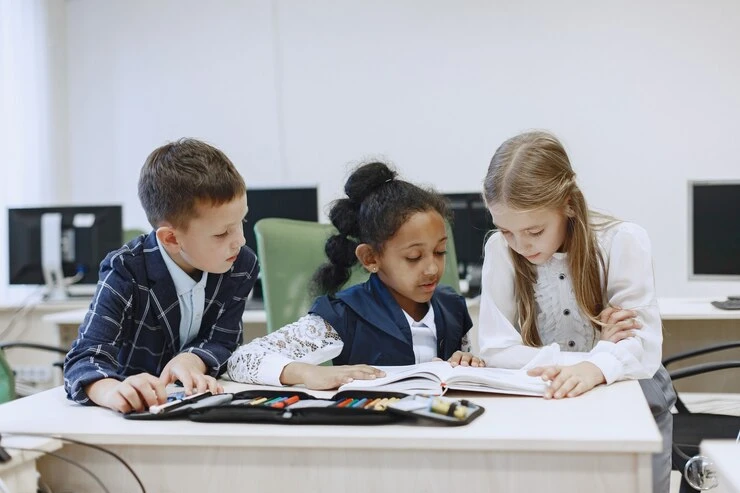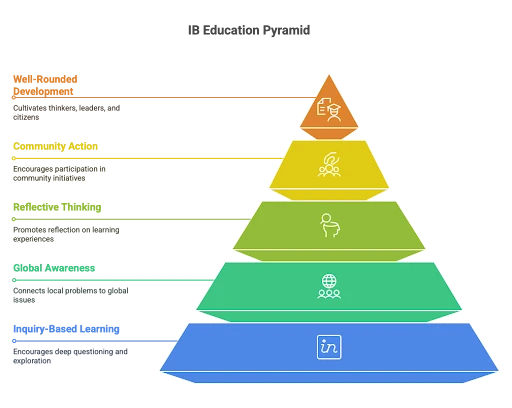Are you trying to pick the right elementary school near Chesapeake for your child… but overwhelmed by the options?
You’re not alone.
Most parents in the States are asking the same question, especially when it comes to teaching styles. Should you go with the familiar traditional model, or is inquiry-based learning a smarter path for today’s world?
Let’s break it down. Because the choice you make now will shape how your child thinks, learns, and succeeds for years to come.
The Core Difference: Passive vs. Active Learning
Here’s the simplest way to look at it:
- Traditional learning = Sit, listen, memorize, repeat.
- Inquiry-based learning = Ask, explore, discover, connect.
Traditional models follow a teacher-led structure. Students listen, take notes, complete worksheets, and prepare for standardized tests. It’s the system most of us grew up with.
Inquiry-based learning flips the model. It’s student-centered. Teachers don’t just deliver answers — they guide students to ask better questions. Students become active participants, not passive receivers.
Still wondering which approach wins? Let’s compare them side-by-side.
Traditional Learning: Pros, Cons, and Who It’s For
Traditional classrooms are built for efficiency and control. Here’s what that looks like:
Pros:
- Clear routines and expectations
- Standardized assessments to measure progress
- Emphasis on core academic skills (math, reading, writing)
- Works well for students who thrive on structure
Cons:
- Less room for creativity or critical thinking
- Can discourage curiosity
- Emphasis on memorization over understanding
- Not ideal for students who learn differently
This model can still work for the right student. But in a world that values innovation, adaptability, and collaboration, it’s showing its limits.
Inquiry-Based Learning: Designed for the Modern Learner
Now let’s talk about the future. Inquiry-based learning is becoming the go-to model for progressive schools, especially those offering International Baccalaureate (IB) programs.
Pros:
- Encourages critical thinking and problem-solving
- Builds real-world skills: collaboration, communication, creativity
- Connects learning to life, not just to a test
- Supports emotional and social development
- Nurtures curiosity and independent thought
Cons:
- May feel unfamiliar to parents used to traditional methods
- Requires highly trained teachers and flexible curriculum
- Takes time to measure results beyond test scores
It’s not about “letting kids do whatever they want.” It’s about creating structured exploration — giving students the tools to go deeper and own their learning.
And the results? Kids stay more engaged, retain information longer, and develop the kind of skills colleges and employers are begging for.
Let’s Get Real: What Does This Look Like in Class?
Here’s a quick snapshot of how the two styles actually play out in the classroom.

The IB Advantage: What Makes It Stand Out?
You’ve probably heard of IB programs — but what makes them different?
The International Baccalaureate (IB) is a global framework that uses inquiry-based learning to develop well-rounded, globally aware students. It’s not just about grades — it’s about growing thinkers, leaders, and citizens.
In an IB elementary classroom, kids are encouraged to:
- Ask deep questions
- Connect topics across subjects
- Explore global issues and local problems
- Reflect on their learning
- Take action in their community
IB isn’t just another curriculum — it’s a mindset. And it prepares kids for life beyond the classroom, not just the next quiz.
Why More Parents in Chesapeake Are Looking Beyond Traditional
If you’re searching for elementary schools in Chesapeake, VA, you’ve probably noticed more parents asking for:
- “Student-led learning”
- “Project-based classrooms”
- “Global education models”
- “Creative learning environments”
That’s not a trend — it’s a response to what the world now demands. Rote memorization won’t cut it anymore. Today’s students need:
- Problem-solving skills
- Confidence in communication
- Cultural awareness
- Adaptability in fast-changing environments
Inquiry-based programs like IB deliver that. Period.
What Skills Are Students Really Learning?
Let’s be honest: Math, reading, and science are critical. But that’s the baseline.
In an inquiry-based school, especially one using the IB model, students also develop:

These aren’t just education buzzwords. These are the traits that future-ready kids will need to thrive in real life.
How Parents Fit In
In inquiry-based schools, you’re not just an observer — you’re a partner in the learning process.
You’ll still get updates on your child’s academic progress, but you’ll also hear things like:
- What questions your child is asking
- What problems they’re solving
- What reflections they’ve made about their work
- How they’re growing emotionally and socially
It’s not just about test scores — it’s about developing a whole child.
“But Will My Child Learn the Basics?”
This is a common concern. And the answer is yes.
Inquiry-based schools still teach all the core subjects — reading, writing, math, science, and more. But they teach them in ways that connect to real life. Your child won’t just learn what to think — they’ll learn how to think.
For example:
- In math, students may explore budgets, patterns, or measurement through hands-on projects.
- In science, they might investigate ecosystems through local nature walks.
- In reading, they’ll not only understand the story but also discuss character choices and worldviews.
The result? Stronger comprehension, better retention, and higher engagement.
When Should You Make the Switch?
Here’s the thing: the earlier, the better.
Why? Habit, confidence, and curiosity start forming early. If your child builds those inquiry muscles in elementary school, they’ll have a massive head start — not just in academics, but in life readiness.
So if your child is entering school or needs a new environment that fits how they naturally learn, this is the time to act.
Bottom Line: Which Learning Style Wins?
Traditional learning may still have a place. But if you want your child to thrive in today’s world — a world that rewards innovation, collaboration, and resilience — inquiry-based learning is the clear winner.
And if you want inquiry-based learning with global standards, the IB model is your best bet.
If you’re looking for Chesapeake elementary school, or Virginia Beach, or Norfolk, and looking for an inquiry-based school that delivers real results, you don’t have to look far.
Strelitz International Academy is the only IB elementary school in Virginia Beach, offering the Primary Years Programme (PYP) to help your child build curiosity, confidence, and real-world skills.
We combine inquiry-based learning with strong academics, experienced teachers, and a diverse, supportive environment.
Contact us now to learn more about our IB program and schedule a tour of our elementary school in Chesapeake, VA. See what a modern, future-focused education can look like.



